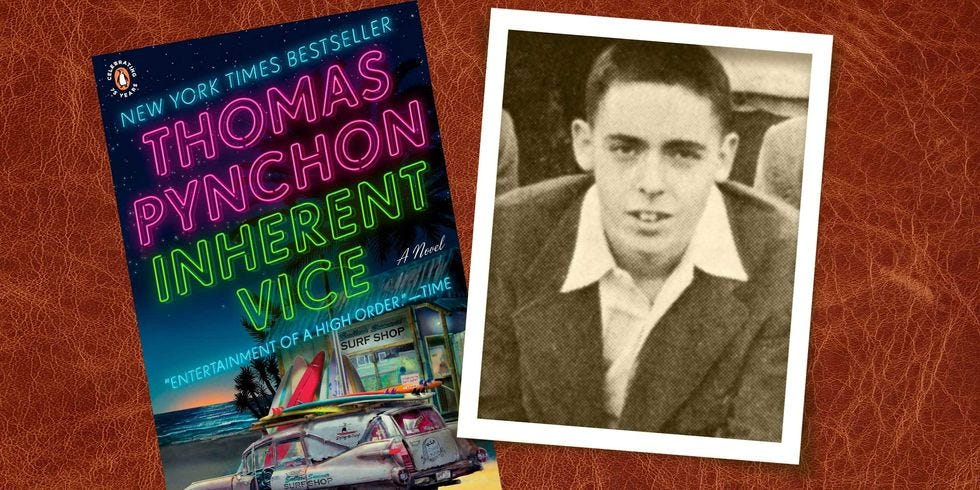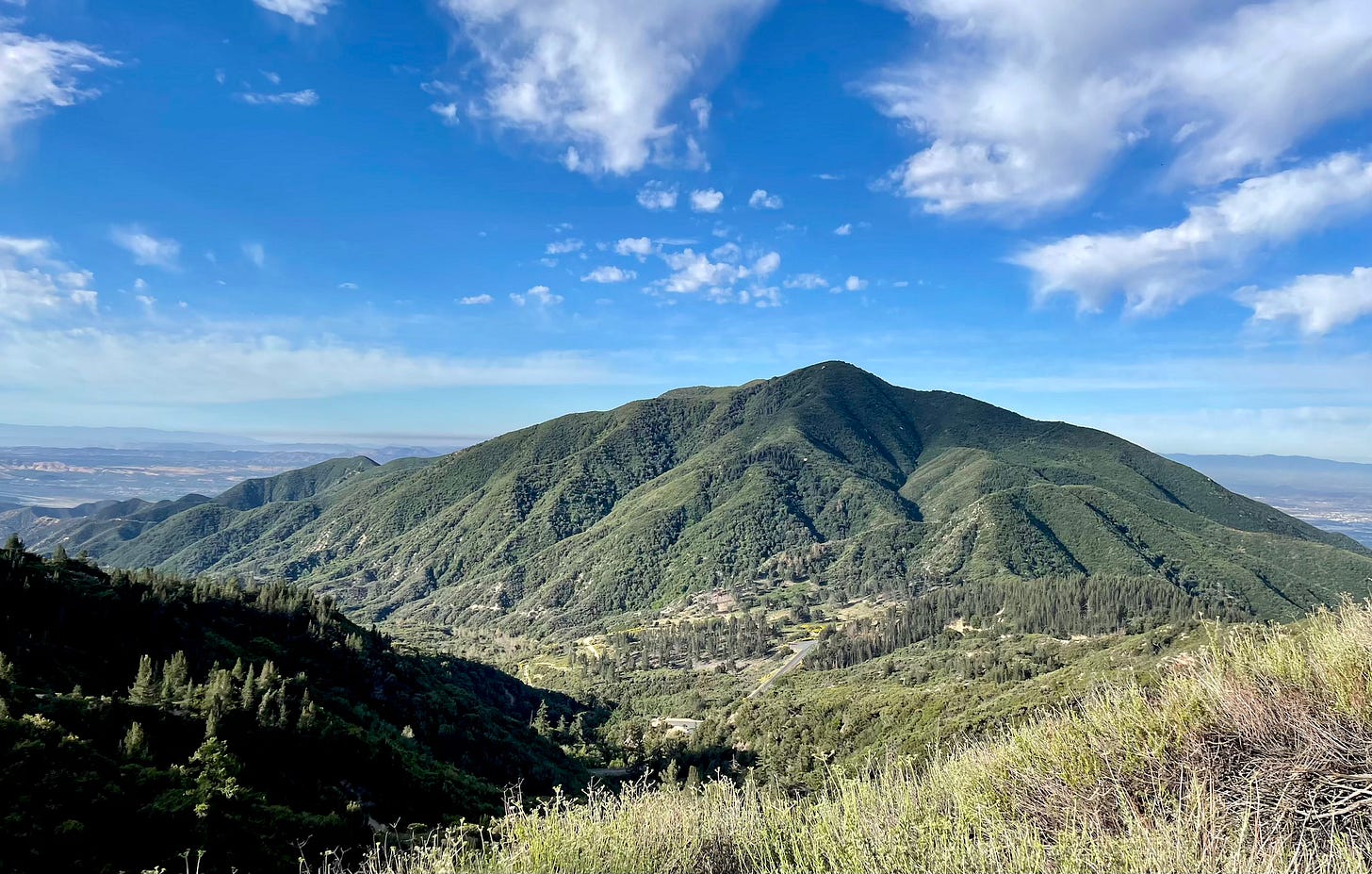Greetings from the SoCal heatwave!
Do you remember when I attended International Pynchon Week?
Well the story I wrote about going to Vancouver to talk to Thomas Pynchon scholars about Inherent Vice was published earlier this week by Alta Journal. It’s called “Pynchon at the Beach” and I hope you’ll take a moment to check it out. (Even if you click to read later.) Here’s a teaser:
Doc’s reverie extends to the harassment of Blacks by the local police department, a practice “dating back to shortly after the Second World War, when a black family had actually tried to move into town and the citizens, with helpful advice from the Ku Klux Klan, had burned the place to the ground and then, as if some ancient curse had come into effect, refused to allow another house ever to be built on the site.”
His memory is correct. The property in question is now a beachfront park that sits between 26th and 27th Streets. Thanks to Senate Bill 796, which Governor Gavin Newsom signed into law in September 2021, the land, known as Bruce’s Beach, will be returned to the descendants of Charles and Willa Bruce, the owners who were forced to abandon their property just as Doc describes.
I’ve already shared how I became a Pynchon fan and told some (hopefully) amusing anecdotes about my relationship with his books. I also posted some photos of Thomas Pynchon’s apartment on my Instagram account. However, I haven’t talked about what Pynchon means to me as a writer.
When I got out of the Navy, I had no idea what I wanted to do with my life. All I knew was I didn’t want to be in the Navy anymore. When I went to Radford University in southwest Virginia, the only school in my home state that would take me, I was motivated to get good grades but lacked direction or purpose. As a freshman I declared my major in computer science—computer science!
I showed up to my first week of class like a poster boy of the sleazy nineties—a half-ass faux hawk, Doc Marten boots, and a Minor Threat bottled violence T-shirt. I folded my arms across my chest, and dared my professors to teach me something. Thankfully, they were up for the challenge. Thanks to Tim Poland, Jolanta Wawrzycka, and Louis Gallo I fell in love with literature and decided I wanted to be a writer. One of the writers I encountered over and over again during my apprenticeship was Thomas Pynchon.
I understood why my professors were pushing Pynchon on me. I’d just spent two years before the mast and Pynchon had famously interrupted his education at Cornell with a similar stint in the US Navy. We were both squids. Even though his writing is riddled with the kind of profane humor that is the hallmark of the salty sailor, I wasn’t ready for Pynchon.
My time in the Navy had been a blessing and a curse. It took me all over the world and opened my eyes to many things, but the experience dealt a blow to my confidence and self-esteem. I got in so much trouble, most of it alcohol-related, that I was constantly berated by my superiors. I was called a dumb motherfucker and stupid son-of-a-bitch with such regularity that I started to believe it.
Instead of feeling like I’d gained valuable life experience during my time in the fleet, I felt as though I’d fallen behind. My classmates in high school were now juniors in college while I was just starting my educational journey. I used to read biographies of famous writers and compare my experience with theirs. Mostly it was a study in contrasts: I’d written very little because I didn’t know how to write. My stories were vignettes full of empty gestures and look-at-me prose. The one longer work I’d written, a novella, was about a sailor who commits suicide by leaping off the fantail of the ship.
But I didn’t give up on Pynchon. It took me several tries to get through V, Pynchon’s first novel, and I didn’t read Gravity’s Rainbow, his masterpiece, until after I graduated from college during a weird two-week window between my first trip to Ireland and moving out to LA. Reading Pynchon was aspirational. I knew I wouldn’t get every allusion or even know what was happening most of the time and that was okay. Instead of trying to read Pynchon so I could write like him, I learned to simply enjoy him.
And I still do. Driving around listening to Pynchon’s California novels this summer brought me an enormous amount of comfort and pleasure. Pynchon was my co-pilot while driving the freeways between San Diego and LA, in the mountains of San Bernardino, and down the coast through central California. He kept me company through the highs of publishing Corporate Rock Sucks and the lows of my father-in-law’s passing.
I have one more Pynchon story, and it’s probably my best. Almost 30 years ago, in January 1993, I went to see NOFX at the Palomino in North Hollywood. I want to say that Agent Orange was also on the bill but I might be mixing up my memories. I worked nearby at Eagles Coffee Pub, a place and a time I’ve been thinking about a lot lately.
One of the guys who lived in the apartment above Eagles was named Cash and he was a bartender at the Palomino. Cash was cool and used to give me free drinks when I went to see shows at the Palomino, which explains why my memories of the place are so unreliable.
As I was leaving the Palomino that night, I spotted the comedian Steven Wright. Steven Wright is the king of the dead-pan comics. I saw him perform at Radford in the late eighties and afterwards my stomach hurt from laughing so much. I didn’t know that was possible. Wright is a master of creating surreal scenarios and building on them until they collapse under the weight of their own absurdity.
So I’m at the Palomino and there’s Steven Wright and I say to him: “Excuse me, but have you ever read Gravity’s Rainbow by Thomas Pynchon?”
Steven Wright stops and considers the question. To my astonishment he answers me. “You know, you’re like the third or fourth person who’s asked me that. What’s it about?”
By this point you either know what Gravity’s Rainbow is about or you don’t, but even if you’ve never read it, especially if you’ve never read it, you probably know that summarizing Gravity’s Rainbow is an impossible task, like summarizing an encyclopedia. It can’t be done. So I said the simplest, truest thing I could think of about the book.
“Paranoia.”
And Steven Wright laughed.
With Pynchon’s help, I made the king of the deadpan comics laugh. I took a page out of George Costanza’s playbook and left the Palomino on a high note, knowing that I had caused my favorite stand-up comedian to crack a smile.
In Praise of Nardwuar
As much as I enjoyed spending time with Pynchon scholars, visiting Vancouver for the first time, talking about Corporate Rock Sucks at Neptoon Records, and hanging out with my friend Sean Carswell, the highlight of that trip was getting interviewed by Nardwuar.
I don’t know how or when Nardwuar got famous or if he’s always been famous in the exact same way only now more people pay attention to him. I’ve always thought that how artists treat Nardwuar was a window into their character. If you’re a dick to Nardwuar, you’re probably a dick. (Henry Rollins was not nice to Nardwuar the first time he interviewed the vocalist. Snoop Dogg, on the other hand, has always been cool to Nardwuar.)
The other day I stumbled upon a tribute to Nardwuar by the journalist Ari Melber of MSNBC that I found really moving. He focuses on the things that make Nardwuar special as an interviewer. Not his hair. Not his clothes. Not the peculiar way he speaks. It was one of those rare moments when the mainstream media gives props to one of our own in an authentic way, and it made me appreciate Nardwuar and his talent even more.
It’s a little long, but worth watching just for the compilation of Nardwuar moments (and if you’ve ever watched a Nardwuar interview, you know exactly what I mean.)
We love you Nardwuar. Keep doing what you doot do.







I'm putting Pynchon on the list. I feel like I'm gonna regret it.
Steven Wright was/is a genius. He should have written a novel.
I read Gravity’s Rainbow and The Crying of Lot 49, years ago. I remember laughing a few times but with the uncertain laugh of someone who is swimming out out of her depth. Mason & Dixon has been sitting on my shelf for years. I am completely intimidated. You’ve convinced me to re-enter the world of Pynchon. And Stephen Wright is, as Jimmy Doom says, a genius.